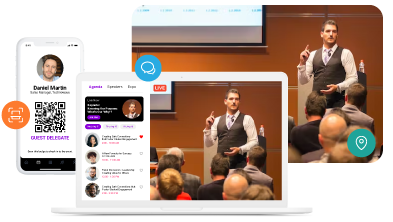As you already know, we have stepped into 2024, and we are constantly experiencing evolution and trends every other day. Similarly, in the event industry, many technological advancements have taken place and changed the way we used to plan things and organize the team while connecting with audiences. Nowadays, the event industry is completely fueled by emerging trends for events depending on factors like audience preference, technical advancements, and global event trends.
From innovative event registration methods to raising demand for hybrid and virtual events while going green and more. In this comprehensive article, we’re going to explore the key trends for events that are shaping the event industry this year. So without further ado, let’s delve into the amazing event industry trends;
10 Top Trends for Events in 2024
Let’s explore the top event industry trends in 2024.

Event Registration Trends
In events, registration is one of the factors that quickly gauge the metrics. Therefore, in recent years, event organizers have tried and tested their best methods, which cater to diverse preferences and technological capabilities.
1. Online Registration Platforms: These platforms are the base of event registration and they offer convenience, flexibility, and robust customization options for both organizers and attendees.
2. Mobile Apps: Dedicated event mobile apps have also become a popular trend for event registration because of their ability to centralize. An app manages everything at one interface; attendee registration, networking opportunities, and agenda management. Event organizers and participants have access to event information and they can easily communicate with each other.
3. Social Media Integration: Not only event registration trends are going viral, but integration with social media platforms has also become increasingly popular. This integration facilitates easy sharing of event details among networks, amplifying visibility and driving registration numbers.
4. On-site Registration Kiosk: To make onsite registration better and streamlined, kiosk machines are equipped with QR codes and NFC technologies so that they can offer an efficient solution. However, these self-service kiosks speed up the event check-in process, eliminating the need for manual tickets and reducing waiting times.
5. Chatbots for Registration Assistance: Utilizing AI-powered chatbots for registration assistance is becoming more prevalent. They offer attendees instant support and guidance throughout the registration process.
Hosting Hybrid Events
Hybrid events are those events which combine two formats of events; in-person and virtual. These events are current industry trends that are gaining popularity because of the flexibility and accessibility they offer. Here are the elements involved:
1. Virtual Event Platforms: To bridge the gap between physical and digital events, robust event platforms are required. as they enable seamless integration of live sessions. Also, they provide virtual networking opportunities for future events.
2. Interactive Live Streaming:. To increase engagement and participation, one of the trends in events is implementing interactive live-streaming features such as Q&A sessions, live polls, and AI chatbot functionalities. As a result, in-person events turn into dynamic virtual experiences for remote attendees.
Video Live Streaming Trends
We are into emerging trends for events, so let’s not forget about video live-streaming trends. It’s one of the event industry trends and a powerful tool for event management and reach.
1. 360-Degree Live Streaming: To go with trends revolving around, implement 360-degree live streaming experiences for your audience. It offers a more interactive perspective, which enhances engagement levels and fosters more participation.
2. Multi-Platform Broadcasting: There’s no doubt that when an event gets broadcast on multiple platforms, it attracts potential relationships. Therefore, ensure that an event is broadcast on multiple platforms, catering to diverse audience preferences and demographics.
Marketing Trends
Without event marketing strategies, it’s always been a challenge to understand the pattern of audience preferences or behaviour. Therefore, with technological advancements in 2024, event strategies for marketing are evolving to adapt to changing demographics.
1. Personalized Marketing: Nowadays, to drive more audience, engagements, and conversion rates, personalized marketing campaigns are being tailored to understand the attendee’s preferences and interests. It is one of the marketing trends that drives all the important key performance indicators.
2. Influencer Collaborations: Getting into partnerships with influencers or industry experts never goes out of style. What’s more real than collaborating with influencers? It shows the credibility and visibility of your brand and opens up networking opportunities by establishing community engagement.
Leveraging Speech-to-Text Technology for Event Recaps:
With modern technological advancements, the use of speech-to-text technology at events can help simplify the summarization of tasks at events. Gone are the days when we had to manually transcribe speeches; this technology automatically converts the spoken content into written text. Event organizers benefit because they can create accurate transcripts of panel discussions, blog posts, presentations, important reports and many other purposes. If you are wondering why these trends are growing in popularity, you should know that written transcripts contribute to better search engine optimization (increased visibility).
Social Media Marketing Trends
Social media marketing is one of the most powerful tools for getting popular in less time. It always remains a cornerstone of event marketing strategies with emerging trends including;
1. Short-Form Video Content: Platforms like TikTok, YouTube, and Instagram Reels allow short-form video content. This short piece of content captures attention and drives engagement while offering bite-sized insights and highlights.
2. Community Engagement: Creating community-driven content, polls, and interactive features encourages participation and strengthens brand loyalty.
Social Media Platforms: Following Up Event Marketing Trends
Event organizers always use social media platforms to market their events. Let’s know more about these social media trends:
1. Instagram: Known for captivating visuals by snake peeks, event highlights and stories, reels or IGTV. Instagram fosters a connection with your audience with so many interactive features.
2. WhatsApp: Take advantage of WhatsApp’s real-time communication capabilities and group messaging capabilities to facilitate networking among attendees, answer inquiries, and provide real-time updates.
3. Snapchat: Provide exclusive previews, limited-time deals, and interactive filters to attract younger crowds. This strategy creates buzz and encourages attendance at events.
4. LinkedIn Promote your event as essential for industry insiders by sharing relevant content, event information, and networking opportunities through LinkedIn posts, articles, and direct messages.
5. Facebook: Capitalize on Facebook’s wide reach and targeted advertising options to promote your event through event pages, sponsored content, and ads.
6. YouTube: Utilize YouTube to live stream keynote speeches, create recap videos, and gather attendee testimonials following the event to maintain interest and attract subsequent attendees.
Investing More in Event Technology
To make event execution smooth, event organizers are now adopting advanced event technologies for streamlined management. Be it pre-event, during or post-event, every step counts in event planning. Therefore, this refers to the trend of investing in event-tech solutions that assist in enhancing security, efficiency, and overall attendee experiences.
1. QR Code Technology: By facilitating contactless registration, access control, and engagement, QR codes minimize physical contact and streamline operations.
2. RFID and NFC: RFID and NFC technologies enable cashless transactions, personalized experiences, and real-time attendee tracking, optimizing logistics and security. That’s why RFID wristbands and badges are in demand.
Leveraging ChatGPT for Marketing
Harnessing the power of generative AI for marketing is one of the top trends for events. AI models, ChatGPT, is used for personalized marketing interactions, customer support and generating ideas for engagement. Here are some key ways in which people are leveraging generative AI for event marketing:
1. Personalized Engagement: Mostly ChatGPT is used for providing personalized interactions to attendees. It assists in analyzing attendee data and preferences, on that basis, event organizers tailor marketing messages and recommendations.
2. Lead Generation: Generative AI can lend a helping hand in lead generation by engaging potential attendees in meaningful conversations. It also guides them through the registration process. ChatGPT can capture attendee information and preferences. Meanwhile, organizers can follow up with targeted marketing campaigns post-event.
3. Automated Content Creation: ChatGPT can generate dynamic content such as event descriptions, promotional materials, and social media posts based on predefined parameters and audience insights. This further streamlines content creation processes and ensures effective marketing efforts.
4. Event Recommendations: Leveraging ChatGPT’s natural language processing capabilities, event organizers can provide personalized event recommendations to attendees based on their interests, past attendance history, and demographic information.
Analyzing Data for Improved Experiences:
The process of analyzing data involves leveraging data analytics tools to gain valuable insights into all the essential elements of events. By utilizing these tools, event organizers can make informed decisions based on trends, patterns, and areas of improvement to enhance event experiences. This further empowers organizers to tailor event offerings and improve services, leading to more engaging and satisfying event experiences for attendees. Here are the details of analytics you can consider for improved experiences
1. Attendance Trends
2. Session Engagement
3. Networking Behavior
4. Content Consumption
5. Feedback Analysis
6. Conversion Rates
7. Geographical Trends
8. Device Usage
Going Green
Last but not least, event management trends are now gaining momentum by becoming sustainability-based events.
1. Reducing Carbon Footprint: Implementing eco-friendly practices such as digital invitations, paperless event registration, recycling programs, and energy-efficient solutions minimizes environmental impact and enhances brand reputation. As a result, it turns into an eco-friendly execution of events.
2. Green Partnerships: Collaborating with sustainable vendors, venues, and suppliers reinforces commitment to environmental management and inspires positive change within the industry.
Conclusion
By the end of the article, we know that 2024 is filled with more transformation in the event industry in terms of innovation, sustainability, and inclusivity. By considering the above trends for events, adapting marketing strategies and prioritizing attendee experiences, event organizers can make their events stand out of the box. They can create impactful experiences for attendees and all stakeholders involved.
Moreover, if you’re someone who’s looking for an event management platform for seamless registrations, live streaming capabilities, engagement or more, Dreamcast can offer you onsite/online solutions to cater for your event needs. Book your event demo now or call us!
Create an Extraordinary Event Experience
Across All Event Formats




















